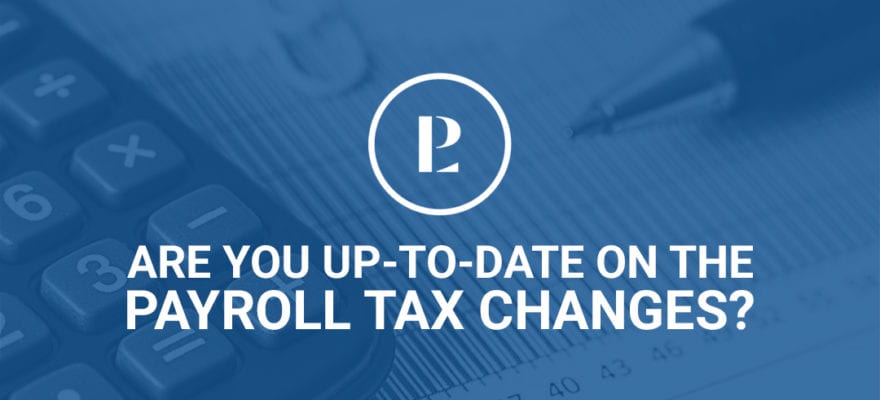As an employer, you know how important it is to stay current on tax changes – especially payroll tax.
There is nothing worse than being struck by a payroll tax bill at the end of the year (or an audit).
Every April, the IRS updates employers on what to expect for the coming year. April 2018 saw interesting changes for employers. And if you have not updated yourself, now is the time.
If you find yourself over your head with payroll tax issues, speak to an attorney. Business tax law, especially back-owed payroll tax, is complicated. You need an attorney with experience handling these types of cases so that you do not risk your business.
Payroll Tax Changes for Bergen County Employers to Note in 2018
You still have a few months of the new changes to deal with before April 2019 rolls around. Therefore, double check to make sure you are compliant with these payroll tax changes that some employers have overlooked.
Wage Withholding Changed
Did you check on the latest withholding changes for 2018 and 2019? If not, the IRS did revise them.
The laws passed reduced individual tax rates, and the exemptions eliminated. So, what do these changes mean for employers?
- Your employees do not require a new W-4 for 2018. Instead, you can use the same form as last year but modify on your end.
- The amount you withhold for taxes in 2018 will be less than 2017.
- The percentage method tables have updated, and you can read them from IRS Publication Notice 1036.
Changes to Social Security and Medicare
In 2018, the wage base for Social Security’s part of the FICA is $128,400. Luckily, no changes were made to the Medicare or social security tax rates for 2018. High earners do not have an increased extra withholding; instead, it remains at the 0.9 percent of all compensation over $200,000.
The New Rules for Fringe Benefits
Fringe benefits are those that employers give to workers for outstanding service, including bonuses, transportation costs benefits, and opening Health Savings Accounts (HSAs).
Here are how the rules changed for those benefits in 2018:
- Achievement Rewards: Any achievement awards that involve tangible personal property are deducted by the employer. Items such as gift cards or cash are not.
- Adoption Assistance: If an employer offers adoption assistance programs for employees, the tax-free benefit they can give is up to $13,840.
- Health Savings Accounts (HSAs): If you use the high-deductible insurance model and still contribute to HSAs for employees, your tax-free benefit still caps at $3,450 per individual employee and $6,900 for families.
- Transportation Benefits: No longer do you have tax-deductible options for transportation benefits. If you do offer vanpools or paid parking programs for workers, employees may receive a bonus up to $260 per month without tax penalties.
Did You Review State Tax Changes?
IRS changes are essential. But January 1st of each year, the state changes their tax requirements for employees too. Make sure you have updated your system to reflect this year’s changes.
What Happens When Employers Do Not Follow New Tax Rules?
The IRS is stepping up their game for pursuing employers who have not paid payroll tax. Sadly, they provide little guidance for employers on what steps they can take or even their rights.
Whether you failed to withhold tax from employee checks, failed to withhold too much, or skipped it entirely, you could face dire consequences.
When a business fails to pay payroll taxes correctly, you pay a penalty. The penalty increases based on the number of days past due. For example, under five days late results in a two percent penalty. If you are over 16 days past due, that penalty jumps to 10 percent.
What if There is Good Reason for Failing to Deposit?
You might have reasonable cause for not depositing payroll taxes. If you do, penalties do not apply. However, this is a rare occurrence. The IRS will only waive penalties if you have enough evidence of reasonable cause or if you timely file your employment tax return.
Should You Consult a Tax Attorney?
Owing payroll tax to the IRS is not the same as owing individual taxes. The money you withhold from employees does not belong to your business; it is paid from the employee’s check to the IRS by your company.
Not paying these taxes on time equals bad news for your company.
You are required by law to make your employment tax deposits monthly, which you do through the Electronic Federal Tax Payment System (EFTPS). Likewise, you must submit your returns on time or penalties might increase up to 15 percent.
Criminal and Civil Penalties Might Apply
Even if you are behind, consult with an attorney rather than try to settle this alone. You not only have the IRS to worry about, but you could face criminal and civil penalties for failure to pay.
Contact a Local Payroll Tax Attorney Today
If you are over your head with payroll taxes, and you need legal guidance. Contact Paladini Law today. We know what it is like to deal with the IRS and the burden of past due taxes. Let our team help find a solution that keeps your business doors open and prevents you from the criminal consequences.
Schedule a consult for your payroll tax issue now at 201-381-4472 or request more information online.
Related Posts:
- Employee Vs. Independent Contractor & Tax Misclassification
- IRS Letter 1153- What It Means and How to Respond
- What Does a WR-30 Look Like & How Do I Do It?
- Is an IRS Offer in Compromise the Right Choice for Your Tax Situation?



